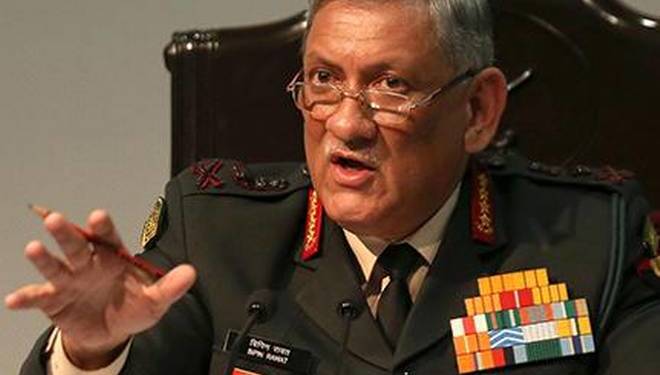Army Chief Bipin Rawat has given an interview to the Times of India in which he has spoken about the pertinent issues concerning India’s national security such as the recent reports of the reactivation of the Balakot terror training facility in Pakistan and the nuclear threats extended by the Pakistan’s top political leadership including its Prime Minister Imran Khan.
In what is clearly a stern message to Pakistan he has made it clear that India won’t allow Pakistan to vitiate the atmosphere in Kashmir. He also spoke about how a large number of people in the state of Jammu & Kashmir (which is going to be bifurcated into two Union Terrorities with effect from October 31), have come to realise that “what happened has” (abrogation of Article 370) happened for the good. But there is also a section which is trying to propagate that the rights of the people of Kashmir have been taken away.
The COAS has spoken at length about issues concerning India’s security situation in this interview. One of the highlights of the interview is the manner in which he asserted that although India upholds the sanctity of the Line of Control (LoC), it is no longer going to be “hide and seek”. India will go across the LoC, through “the air or the ground route or both.” He said this while replying to a question about what the Balakot airstrikes earlier this year and the Surgical Strikes in 2016 have achieved. The Army Chief made it clear that a “red line” has been very clearly drawn as to what the future course of action will be.
It must be noted that as per recent reports the Jaish e Mohammed terror training camps in Balakot, Pakistan which were bombed by the Indian Air Force earlier this year has been reactivated by Pakistan. Moreover, intelligence assessment, several hundreds of Pakistani terrorists have lined up along the Line of Control (LoC) waiting to infiltrate into India. It must be noted that earlier Bipin Rawat had hinted stronger action after Pakistan reactivated the Balakot terror training camp. Replying to a reporter’s question about whether a repeat of a similar action could be expected, the COAS had said, “Why must we expect a repeat of a similar thing? Earlier we did something, then we did Balakot, why not keep the other side guessing as to what we will do? Why tell them what we are going to do. Why not keep them guessing? Why say repeat? Why not something beyond that?” With his comments about crossing through “the air or the ground route or both,” if Pakistan tries to vitiate the atmosphere seems to corroborate the hints that he had given earlier.
During this interview, the Army Chief also demolished the nuclear bogey that Pakistan has been raising every now and then ever since abrogation of Article 370 by India. The Pakistan PM Imran Khan even went on to raise the nuclear bogey at the UN General Assembly session held recently in New York. Army Chief Bipin Rawat has made it clear that Pakistan’s nuclear threats expose its “inappropriate understanding” of such weapons. Bipin Rawat said that nuclear weapons are not weapons of war-fighting but weapons of deterrence. Therefore, it is difficult to comprehend when someone claims that such weapons would be used for war-fighting or in cases where one is attacked. He further debunked Pakistan’s fake nuclear threats by stating, “Will the world community ever allow you to use nuclear weapons like this?”
The fact remains that nuclear weapons are not weapons of practical utility. They guarantee total annihilation and not a subtle degree of military pressure that might be required for achieving realistic political objectives. Pakistan has been stressing upon the effects of an all conflict between “two nuclear countries”, a narrative that Pakistan has been propagating frequently and took it up even at the UNGA. What Pakistan is trying to do is point towards the nuclear button and extort the entire world by making threats of committing nuclear suicide. It is generally accepted that high-yield nuclear weapons are only meant for deterrence and not for practical utility. Even in the case of Indo-Pak relations, the impracticality of nuclear weapons became pretty much clear in 1999, merely a year after both India and Pakistan became nuclear armed countries. Even during the Kargil war, both India and Pakistan were nuclear powers. However, the war did not even go beyond the Kargil sector leave alone the question of the conflict escalating into a nuclear face off.
Typical #Pakistan bogey. India & Pakistan fought the #Kargil war in 1999 after both went nuclear in 1998. It did not even escalate beyond Kargil sector let alone reach a nuclear threshold. @ImranKhanPTI is ranting war war only for global attention that is still not coming to him https://t.co/urnXD0Ts8p
— GAURAV C SAWANT (@gauravcsawant) September 15, 2019
Pakistan has been relying predominantly upon the jihadist terrorism and the nuclear bogey in order to create to blackmail India in particular and even the entire world in general, ever since the abrogation of Article 370 of the Constitution. Pakistan has emerged as the hotbed of terrorism. Now, by extending nuclear and jihadist violence threats, it is trying to blackmail the rest of the world against any action over its mischievous policy of providing safe havens to terror outfits. But with the Indian Army Chief calling on its fake threats and lies, India has given a stern message to Pakistan.
























